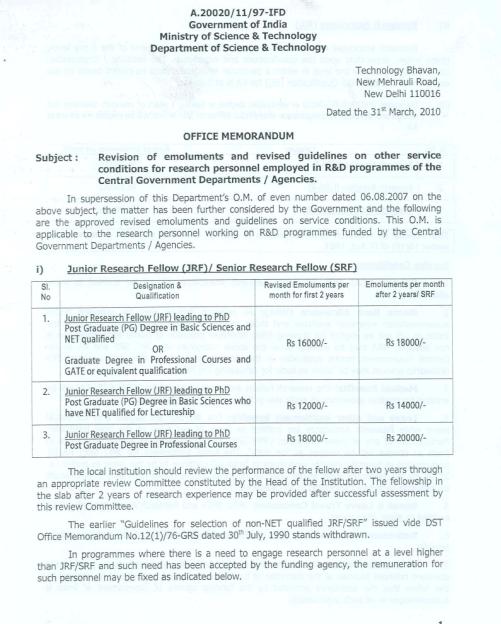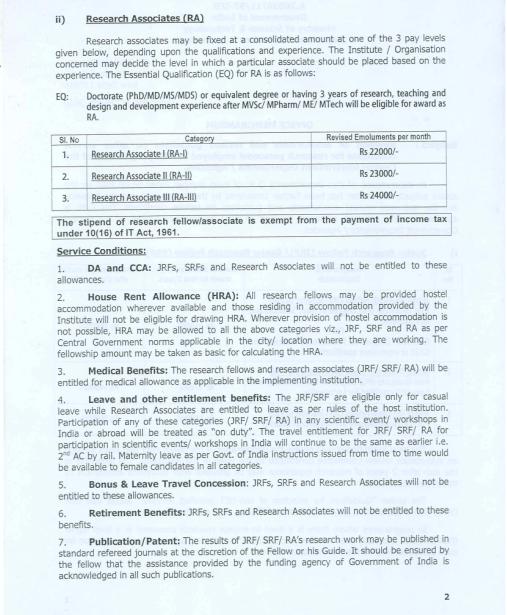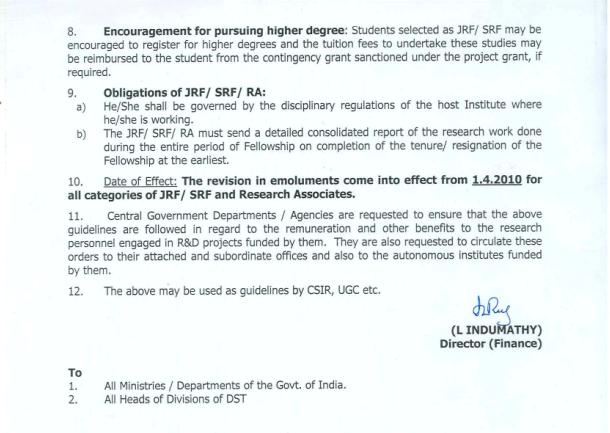DST increases stipends for research fellows and research associates
Following is from http://www.dst.gov.in/whats_new/whats_new10/fellowship10.pdf.Thanks to a reader for the pointer.



2 comments April 8th, 2010
Following is from http://www.dst.gov.in/whats_new/whats_new10/fellowship10.pdf.Thanks to a reader for the pointer.



2 comments April 8th, 2010
IISc Bangalore faculty Prof. Abi has a nice article on this in the IIT Kharagpur student magazine Scholar’s avenue. Following are some excerpts arranged as bullet points.
1 comment November 2nd, 2009
Following is from http://www.cse.iitd.ernet.in/~jalote/misc/phd_surveyIITK-D-B.pdf linked from Prof. Pankaj Jalote’s home page at IIT Delhi.
Based on the above survey, a simple way to build a private top quality university in India is to pay more than twice the amount that is paid to faculty at IITs/IISERs/NISER (starting with 100K/month to assistant professors) and to pay Rs 40K/month to Ph.D students. These Ph.D students may be asked to help in teaching as teaching assistants in US universities do. That way many top undergraduates will pursue Ph.D in this institute and by paying more than twice to the faculty the institution can attract top faculty. This could be a a data point for Vedanta University.
1 comment June 12th, 2009
(Thanks to Abi for the pointer.)
In the document here just above Section 1.7 it says:
NOTE: Candidates with BE/ B Tech/ M Sc or equivalent degree who may not have qualified in any of the above mentioned National Entrance Tests will also be considered for the Ph D program in Engineering. Short listing for interview of such candidates is based on their academic performance in the qualifying degree (upto 3rd year in BE / B Tech, or 1st year in M Sc), and their performance in 10th and 12th /PUC examinations.
I have heard from a friend in IIT Kharagpur that this is also possible in the IITs but could not find it in the Ph.D program page of IIT Kharagpur. If one is interested they may directly contact a faculty in the apropriate IIT regarding this.
1 comment March 10th, 2009
It is a good idea for some to consider pursuing M.Tech (via GATE) after B.Tech and then go for an academic job in engineering colleges. One may also consider doing a Ph.D and going after a faculty job in top institutions. Some of the reasons are:
183 comments December 16th, 2008
The following is from http://education.nic.in/scholarship/Schol-es.asp.
GENERAL GUIDELINES
Ministry of Human Resource Development, Department of Education administers only those scholarships/fellowships which are being offered by the foreign countries under Cultural Exchange Programmes and other Programmes. The subject fields are generally chosen for those subject fields, facilities for which are available in the donor country and also keeping in view the national needs.
2. On receipt of the offer of scholarships/fellowships from the donor country, the same is advertised on Department’s website www.education.nic.in and in some cases leading newspapers and through circulars to States/UTs, Universities etc. giving all the details regarding amount of scholarship, age limit, educational qualification, experience etc. Application format is also published in the advertisement. No application form is supplied by the Ministry. The advertisements are published at different times for different schemes according to the time notified by the donor countries. However, tentative months, during which advertisements were published on the basis of offers received form foreign countries on the previous occasions are indicated for convenience. Future dates will depend on offers when received. These advertisements are published by the D.A.V.P. and desiring candidates should submit their applications by the last date indicated in the advertisement. No application is considered which is received after the due date. Offers are open to both employed and unemployed candidates. Employed candidates are required to submit their applications through their Employers with ‘No Objection Certificate.’ However, advance applications are also considered provided the `NOCs’ are submitted to the Ministry in due course. Application can also be submitted online.
3. The scholarships/fellowships are awarded on merit on all India basis. The selection is made through a Selection Committee constituted of subject experts. Most of the scholarships are for doctoral and post-doctoral studies. Scholarships are also available at post-graduate level for language study, Fine Arts and some other subjects as being notified in each advertisement. All the details regarding scholarships would be available in the advertisement and the advertisement should be read carefully before submitting the application to this Ministry. Incomplete applications and applications for subjects other than what has been notified, are not considered. The decision of the Selection Committee on selection of candidates, is final. However, decision regarding award of scholarships rests finally with the donor countries. No scholarship is available to study at under-graduate level except language study.
4. Applications of candidates who are residing abroad, are not considered. Candidates who have been abroad for study/specialisation/training either on scholarship or on their own for a period exceeding six months are eligible to apply only if they have been in India for at least two years after their return from abroad on a specified date.
5. Candidates should have adequate knowledge about India and the country for which application for scholarship is being submitted.
6. At present, following countries are offering Scholarships for India.
1 comment November 9th, 2008
From a Times of India report:
…..
In fact, from 1999 to 2001, all the IITs put together merely graduated 240 PhD students.
This appears to be changing. In 2007-08, the Powai campus, which is celebrating its golden jubilee, is expecting at least 210 doctoral students to graduate. This is a huge jump from last year, when 152 doctoral students received PhDs.
….
This is pretty impressive. I hope the trend continues, not only at IITB but also at other IITs. Private engineering colleges will hopefully tap into this talent pool for their faculty recruitment.
8 comments June 23rd, 2008
Following is an excerpt from a report in indiaedunews.
As per the last year records, 140 PhDs were awarded to engineering graduates by the Indian Institute of Technology, Delhi (IIT-D) highlighting the increasing trend of students opting for research.
To further encourage Research and Development, IIT-D has also come up with scholarships up to Rs.20,000/- per month for research students. Furthermore, accommodation and in-house facilities are also being provided to research scholars.
According to Mr. M. Balakrishnan, Dean, Post Graduate Studies and Research at IIT-Delhi, "Industrial Research and Development (R&D) in India, is getting bigger day by day. Today, the private sector employs PhDs in all disciplines- Automobiles, Energy, Environment, Materials."
Mr. Balakrishnan, while disagreeing to the fact that salaries are a constraint for PhD-holders, pointed out, "A PhD done by a researcher in any of the engineering field today is paid anywhere between Rs.8 lakh to Rs.16 lakh per annum."
He further added that, the companies involved in the technology establishment pay the highest amount, "Companies such as Google and Yahoo, who work with new technologies, pay the highest amount to the researchers."
May 8th, 2008
The following is an excerpt from http://specials.rediff.com/money/2007/oct/25sld3.htm.
My concern is that many bright students who would be leading scientists and researchers choose other careers because of misinformation. In talking with non-academic friends, particularly those in the Indian community, I think there are two misconceptions that need to be corrected. First, one does a PhD not so much to teach but to do research that will have a big impact. Many people view professors as skilled teachers – which is one important aspect of the job – but fail to realise that many of the fundamental discoveries in society that make our quality of life better today than in 1900 are made by academics. So I think that the social value of pursuing a PhD may be underappreciated. Second, academia has the reputation of being a very tough life, particularly financially. But I think the monetary rewards of academia are also often misperceived. This is especially true at top universities for quantitative fields, where salaries compare quite favorably with many specialties in medicine or law. Some people ask, "Why are economists and scientists paid so much to sit and think?" I think of the answer one of my colleagues at Berkeley gives: ‘If Milton Friedman’s research helped us avoid another Great Depression, then he’s paid the bill for all the economists in this generation.’ Now of course not every person is going to do what Milton Friedman did… but if one out of every ten thousand does, it’s worth paying researchers a lot. One of my objectives in the longer run is to try to attract more bright students to top PhD programs. For example, there’s an enormous pool of talent at the IITs in India that I think could be very successful. I’d like to think about ways to encourage some of that group to apply to PhD programs in the US.
October 29th, 2007
Dr. R. K. Ghosh pointed us to a Forbes article by the Editor in Chief of JACM. Following is an excerpt from it.
The U.S. produces about 1,400 Ph.D.s in computer science annually and China about 3,000. By stark comparison, India’s annual computer science Ph.D. production languishes at roughly 40. That number is about the same as that for Israel, a nation with roughly 5% of India’s population size.
While India needs all the new IITs, IIITs and Central Universities that the PM announced during his Aug 15 speech, one wonders where from these institutions will get Ph.Ds for their faculty. The government and the IT industry must brainstorm together and come up with a strategy to tackle this. Following are some initial un-coordinated half-baked thoughts.
82 comments August 17th, 2007
| M | T | W | T | F | S | S |
|---|---|---|---|---|---|---|
| 1 | ||||||
| 2 | 3 | 4 | 5 | 6 | 7 | 8 |
| 9 | 10 | 11 | 12 | 13 | 14 | 15 |
| 16 | 17 | 18 | 19 | 20 | 21 | 22 |
| 23 | 24 | 25 | 26 | 27 | 28 | 29 |
| 30 | 31 | |||||